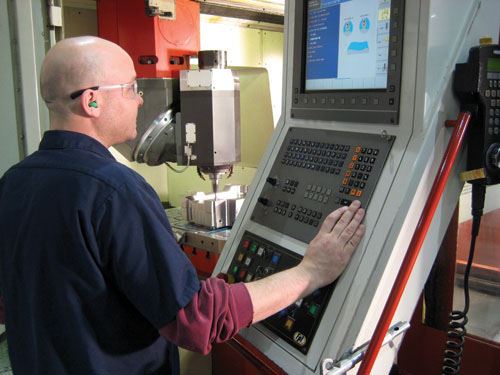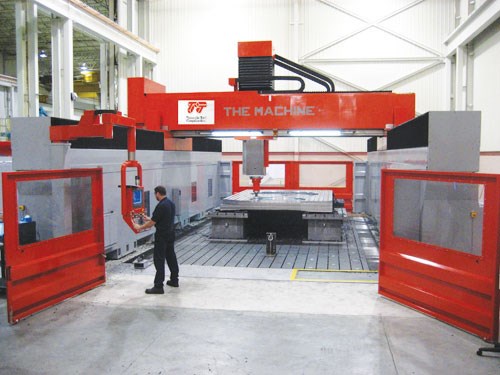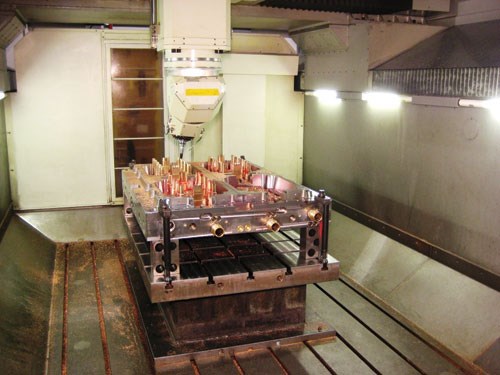Moldmaker Maximizes Its Large Machining Niche with the Right CAD/CAM Software
This year’s Leadtime Leader Large Shop, Triangle Tool Corp. (Milwaukee, WI), has strategically positioned itself as a leader in building injection, SMC (sheet molded compound) and BMC (bulk molded compound) compression, structural foam and blow molds for large plastic parts—and has always used Delcam’s (Windsor, ON) software exclusively.
This year’s Leadtime Leader Large Shop, Triangle Tool Corp. (Milwaukee, WI), has strategically positioned itself as a leader in building injection, SMC (sheet molded compound) and BMC (bulk molded compound) compression, structural foam and blow molds for large plastic parts—and has always used Delcam’s (Windsor, ON) software exclusively. When the company added specialty large part machining to its repertoire of services, Triangle once again put Delcam to the test, which the CAD/CAM manufacturer passed with flying colors—allowing Triangle to maximize the use of its five-axis machines for this newly found niche.
According to Daniel Gouge, Triangle’s Technical Sales Engineer, Triangle produces molds for many of the country’s most recognizable names in home appliance, agriculture, consumer products, and returnable packaging, in addition to the manufacture of custom components, castings, and forgings for the aerospace, energy and transportation industries.
“Because Triangle Tool has specialized in large steel products, it is common for steel blocks or forgings to weigh greater than 25 tons and need multiple, precision operations for each piece,” Gouge elaborates. “Most companies would find this type of work intimidating, but Triangle Tool has leveraged large work to become one of Wisconsin’s strongest businesses. Large work has its own set of challenges. Safety is of the utmost concern. With bigger pieces, worker safety is magnified because you’re not dealing with the loss of a finger or toe—the blocks can crush people. Safety is something a company must be committed to. Secondly, the overhead costs are multiplied when buying machines for large work. You need larger cranes, deeper foundations, etc. Because we have made the investment to handle this large work, we are capable of handling many large pieces at once. Not many companies have the capability to do this. They may be able to handle one or two pieces—but not 20 pieces at once. This is commonplace at Triangle.”
Supportive Software
Using the PowerMILL CAM system and PowerSHAPE CAD software from Delcam has played a vital role in the company’s new specialty machining niche, notes Triangle Engineering Manager Mark Pitzen. “We have used Delcam for years because of their commitment to innovation and optimization of the machining process,” Pitzen states. “All of our core and cavity blocks are programmed offline and the programs are fed to the machines through our network. For our specialty machining business, we use Delcam to program all of the intricate shapes and details. The versatility for both sides of our business has been instrumental to us being competitive and winning work. Additionally, every mold, forge or casting that Triangle Tool machines is fully programmed, paths verified and machined using Delcam products. In mold building, there are so many times where you need to add .001” to a surface for polish stock or cut a shutoff with .0005” clearance. Delcam makes small modifications very easy because the software is so user-friendly.”
Pitzen points out that years ago, a moldmaker would have to have multiple CAM systems in-house to handle different jobs, but this isn’t the case with Delcam. “Delcam has perfected their product to the point where there isn’t anything we can’t cut with efficient cutter paths,” he notes. “Because it is so capable, we don’t have the additional costs of having other CAM systems in-house. The learning curve is minimal. Many shops won’t make the investment in a do-it-all software, but we did, making toolpathing and metal finishing cost effective.
“When we started our specialty machining division, we didn’t know if we needed additional CAM capabilities,” Pitzen continues. “Delcam told us to put them to the test and their systems have excelled in all areas of machining of castings, forgings and other components.”
Pitzen adds that PowerMILL and PowerSHAPE make the most of the company’s specialty machining niche. “Anyone can buy a five-axis machine, but if your software is limiting your ability to maximize the productivity of the machine, the investment won’t be worth it,” Pitzen concludes.
“Because Delcam was with us early on in the five-axis era, we have been able to test the software and provide feedback. Delcam has been responsive to areas where we saw potential for improvements and made the necessary upgrades to help us machine more efficiently. These regular updates make their product the most robust in the machining industry.”
Read Next
How to Use Continuing Education to Remain Competitive in Moldmaking
Continued training helps moldmakers make tooling decisions and properly use the latest cutting tool to efficiently machine high-quality molds.
Read MoreAre You a Moldmaker Considering 3D Printing? Consider the 3D Printing Workshop at NPE2024
Presentations will cover 3D printing for mold tooling, material innovation, product development, bridge production and full-scale, high-volume additive manufacturing.
Read MoreHow to Use Strategic Planning Tools, Data to Manage the Human Side of Business
Q&A with Marion Wells, MMT EAB member and founder of Human Asset Management.
Read More



















